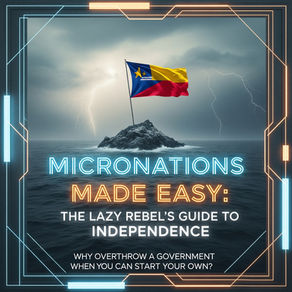All NWO News & Info Posts


Podcast: 1998 Global Sovereignty Reset through NATO Property Transaction


🏴Now or Never: Found Your Own State – Sovereignty with AI Support


6. Micronations Made Easy: The Lazy Rebel’s Guide to Independence


5. Micronations Made Easy: The Lazy Rebel’s Guide to Independence


4. Micronations Made Easy: The Lazy Rebel’s Guide to Independence


3. Micronations Made Easy: The Lazy Rebel’s Guide to Independence


2. Micronations Made Easy: The Lazy Rebel’s Guide to Independence


Micronations Made Easy: The Lazy Rebel’s Guide to Independence


4. Now or Never: Your Own Nation in 30 Days


3. Now or Never: Your Own Nation in 30 Days


2. Now or Never: Your Own Nation in 30 Days


Now or Never: Your Own Nation in 30 Days


4. Science-Fiction-Short-Story: WSD 1400/98 – The Final Judgment


3. Science-Fiction-Short-Story: WSD 1400/98 – The Final Judgment


2. Science-Fiction-Short-Story: WSD 1400/98 – The Final Judgment


Science-Fiction-Short-Story: WSD 1400/98 – The Final Judgment


🧨"War of Illusions – When No Country Is Legitimate Anymore"


NATO in the 21st century: guarantor of peace or geopolitical instrument of power?


Nr.1: System comparison: vs Electric Technocracy


6. HOW STATES COLLAPSE: INTRODUCTION AND THE LOGIC BEHIND DEBT CYCLES

Legal explanations on the state succession deed 1400/98

Protest songs against the
Third World War WW3
Music has the power to unite people and stand up for peace. Discover three powerful protest songs directed against the horrors of a possible Third World War. Be inspired by their message and become part of a movement for a better world. Click on the links, listen and share the hope for peace:
Central platforms for global state succession, succession under international law, and the "sold world"
-
Specialized Google Search Engine (GSE) – targeted WSD search
-
World Succession Deed 1400/98 – global sovereignty & international law
-
Global Archive for International Treaties and State Succession – WSD
-
Electric Technocracy – AI-Governance, Direct Digital Democracy & Post-Scarcity World
-
Navigator for the State Succession Act – quick orientation in the WSD universe
-
International perspective on World Succession Deed and global legal succession
Communities, Repositories, Encyclopedias, Wikis, and PDF vaults
-
International Law Wiki – Juridical Singularity & International Treaties Explained Simply
-
One World Archive Vault & PDF Viewer – global document archive
-
Electric Technocracy - Reinventing Democracy through Technology
-
Third-Party Custody of National and International Agreements
Wikipedia - Ground Zero
-
Free eBooks & PDF downloads on WSD, technocracy, and sovereignty
-
Third-party custody of national and international contracts
-
PDF Vault – Electric Technocracy Visionary AI Governance System
Secure Document Backups
Support & Shop
Corruption & scandals
YouTube, podcasts, and homepages for further reading
-
YouTube Channel – Explanatory videos on Electric Technocracy & WSD
-
Podcast Show – International Law, Succession & Visions for the Future
-
Video: How to Start Your Own Country (Without Getting Arrested)
-
Video: Flags, Laws, and No Man’s Land: The Anatomy of a Modern Microstate
-
DIY Micronation Sovereignty: Constitution & Step-by-step Anleitung
The buyer's memoirs
Vision for the future: Technocracy, ASI governance, UBI, and legal singularity
-
Technological Singularity requires Singularity in Law – Juridical Singularity explained
-
Electric Technocracy Pioneers Community – Pioneers of the new governance
-
The Next Civilization – Why Electric Technocracy Matters Now
-
The Rise of the Electric Technocracy – Governance for a Post-Scarcity Society
International Treaty, micronation guides, and future texts
-
Kaufvertrag Urkundenrolle 1400/98 – Staatensukzessionsurkunde - World Succession Deed Original
-
Starting a State for Dummies – How to Start Your Own Country
-
Trillions for the Future – The path to ASI & technological singularity
-
Unconditional Basic Income, Tech Tax, and a World Without Nation States
-
Micronation Storybook: The Slactivist's Guide to Saving a Forest (By Declaring It a Country)
-
Bundesarchiv Koblenz – Publication - Kaufvertrag Urkundenrolle 1400/98
YouTube, Podcasts und Startseiten zur Vertiefung
-
Start-Page WSD & Electric Paradise – zentrale Einstiegsseite
-
YouTube Channel – Erklärvideos zu Electric Technocracy & WSD
-
Video: How to Start Your Own Country (Without Getting Arrested)
-
Video: Flags, Laws, and No Man’s Land: The Anatomy of a Modern Microstate
-
DIY Micronation Sovereignty: Constitution & Step-by-step Anleitung
Die Memoiren des Käufers:
Facebook, X/Twitter, Spotify, Protest Music
-
Electric Technocracy Sound Collective on Spotify – Artists –
-
Spotify DJ Playlist (Electric Technocracy Sound Collective)
X.com - Twitter



















